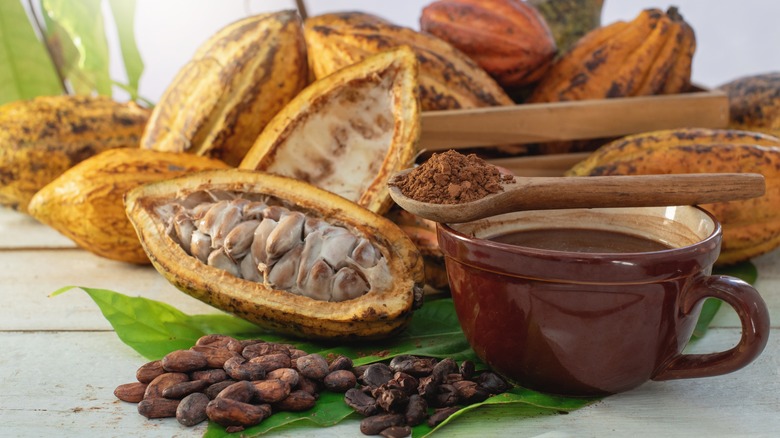Could Cocoa Consumption Be The Key To Lowering Blood Pressure?
Almost half of U.S. adults struggle with high blood pressure, contributing to more than 670,000 deaths in 2020, according to the Centers for Disease Control and Prevention (CDC). Although your blood pressure varies throughout the day, consistently high blood pressure raises the risk of heart disease and stroke. You can take measures to prevent high blood pressure by limiting alcohol and cigarettes, staying physically fit, maintaining a healthy weight, and choosing a healthy diet (via the CDC).
If you're already somewhat healthy, a recent study published in Frontiers in Nutrition found more evidence for another course of action — cocoa. The study recruited 11 healthy participants who were younger than 45 years old. Over eight days, each participant alternated between capsules with 862 milligrams of cocoa flavanols and a placebo. They were also sent home with a blood pressure monitor for the arm and a finger clip to measure the stiffness in their arteries. Each morning, they took their baseline blood pressure and arterial stiffness measures, and then took the designated capsules. They continued to monitor their cardiovascular system for several hours. After 12 hours, their systolic blood pressure decreased by 1.4 on average. Normal systolic blood pressure is below 120, according to the National Institutes of Health.
Don't think that cocoa can replace medication
Although the results of this study might tempt you to eat a dark chocolate bar at every meal, doctors note that the study only included a healthy population, according to Healthline. Those who already live with hypertension won't see their blood pressure drop to healthy levels without medication or other methods of management, per the CDC.
The study had its participants consuming 862 milligrams of cocoa flavanols in capsules. According to Consumer Lab, unsweetened cocoa powder will range from 37-130 milligrams of cocoa flavanols per tablespoon, and a 40-gram dark chocolate bar might have between 136-440 milligrams of flavanols. Some dark chocolate might be in the lower range, and you'd have to eat the whole bar, whereas the unsweetened powder could give you the flavanols without the fat and calories. The processing of cocoa to make chocolate can often destroy some of the naturally-occurring flavanols in cocoa, according to Flaviola. These flavanols can also be found in other plant-based foods, such as gala apples and green tea.


